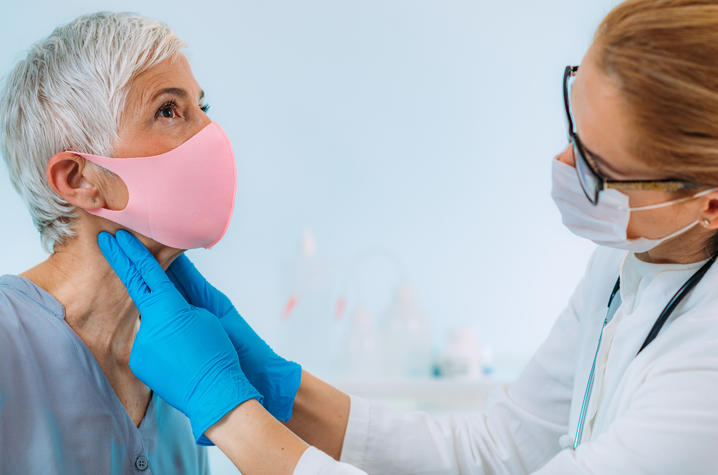Proper Thyroid Function Is Critical for Good Health

The University of Kentucky Public Relations & Strategic Communications Office provides a weekly health column available for use and reprint by news media. This week's column is by Oliver Fackelmayer, M.D., a UK HealthCare endocrine surgeon who specializes in surgical management of benign and cancerous conditions of the thyroid, parathyroid and adrenal glands.
LEXINGTON, Ky. (May 23, 2022) — Your thyroid is a small but vital gland, and the hormones it produces help regulate many bodily functions, like your heart rate, body temperature and menstrual cycles. So if your thyroid doesn’t work like it should, your quality of life could be significantly impacted.
More than 12% of Americans will develop a thyroid condition at some point during their lifetimes, and women are five to eight times more likely than men to experience these issues, according to the American Thyroid Association.
What does the thyroid do?
The thyroid is a butterfly-shaped gland that lays over your windpipe. It produces thyroid hormone, a critical factor for development of a fetus and in infancy as well as metabolism in adulthood.
Thyroid hormone is not simply about gaining or losing weight; it is essential for life and acts on every tissue in your body to regulate protein synthesis and turnover.
What is thyroid disease?
Thyroid disease occurs when there is too much or too little thyroid hormone – hyperthyroidism or hypothyroidism, respectively. It also develops if there is a structural issue with the gland – thyroid enlargement, thyroid nodules or thyroid cancer.
Hyperthyroidism, typically from Graves’ disease, can be cured with surgical removal of the thyroid gland. Hypothyroidism is frequently from Hashimoto’s thyroiditis, an inflammation of the thyroid gland that burns out the thyroid, reducing its function.
What are the symptoms associated with thyroid disease?
Oftentimes, thyroid nodules don’t produce any symptoms and are found on imaging done for other reasons. When they do produce symptoms, you might notice:
- A lump or bump in the front of your neck
- Difficulty swallowing
- A sensation of something stuck in your throat
- Smothering sensation especially when lying flat
- Voice changes
Symptoms of hyperthyroidism include:
- Palpitations or racing heart
- Anxiety
- Tremors
- Weight loss
- Heat intolerance
- Excess sweating
- Menstrual disorders
Symptoms of hypothyroidism include:
- Fatigue
- Weight gain
- Cold intolerance
- Constipation
- Dry skin
- Menstrual irregularities
Additionally, women with hyperthyroidism or hypothyroidism might find it more difficult to conceive.
How is thyroid disease diagnosed?
The first step in any thyroid evaluation is to assess thyroid function. Thyroid-stimulating hormone (TSH) is produced by the brain in response to low-circulating thyroid hormone, so an elevated TSH indicates reduced thyroid function and a low TSH means excessive thyroid function.
The best way to structurally evaluate the thyroid is a neck ultrasound, which examines the entire thyroid gland as well as the lymph nodes of the neck.
At UK HealthCare, we strive to provide a comprehensive visit for every patient. All surgeons perform an in-office ultrasound and, if needed, an in-office biopsy to establish a diagnosis and guide the surgical treatment plan. We accomplish in a single visit for most patients what usually would require three separate visits to different departments on different days.
How is thyroid disease treated?
Thyroid disease often requires an operation to remove a potentially cancerous nodule or a nodule that is causing bothersome symptoms.
If your doctor determines that your whole thyroid gland should be surgically removed, you must take thyroid hormone for the rest of your life as a small pill every morning. Often, we can limit the operation to remove only half of the thyroid, and in many cases, those patients will continue to make enough thyroid hormone to avoid needing supplementation.
As the state’s flagship, land-grant institution, the University of Kentucky exists to advance the Commonwealth. We do that by preparing the next generation of leaders — placing students at the heart of everything we do — and transforming the lives of Kentuckians through education, research and creative work, service and health care. We pride ourselves on being a catalyst for breakthroughs and a force for healing, a place where ingenuity unfolds. It's all made possible by our people — visionaries, disruptors and pioneers — who make up 200 academic programs, a $476.5 million research and development enterprise and a world-class medical center, all on one campus.




